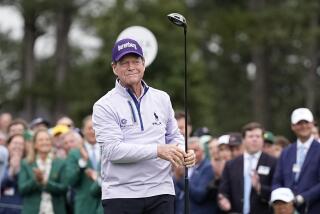Masters Drops TV Ads Over Pressure to Admit Women
- Share via
Augusta National Golf Club, which runs the Masters, one of the world’s most prestigious golf tournaments, announced Friday that it would forgo commercial television sponsorship in order to avoid pressure from women’s groups to admit female members to the club.
The unprecedented step will make the Masters a commercial-free event on network television. CBS has been the principal broadcaster of the event for many years.
In a faxed statement, Hootie Johnson, chairman of the Georgia club, said a women’s group that had been in touch with the club earlier was now urging the tournament’s corporate sponsors--who also are the television advertisers--to pressure the club to invite women as members.
Augusta National has no official policy that excludes women but has never had a female member. It admitted its first African American member in 1990.
Johnson said it was unfair to put the Masters’ media sponsors in the position of having to deal with such pressure, so he notified Citigroup, IBM and Coca-Cola--the only sponsors for the April 2003 tournament--that their support would not be needed.
“We have told our media sponsors that we will not request their participation,” Johnson said.
The first salvo of the club’s battle with women was fired in June, when Martha Burk, chairwoman of the National Council of Women’s Organizations, took issue with the lack of female members at Augusta National, which has been the site of the Masters since it began in 1934.
Burk urged him to open the club to female members before next year’s tournament to avoid having tournament sponsors associated with discrimination.
Johnson waited a few weeks, then fired off a strongly worded response to Burk and released it to the media at the same time.
In a three-page statement, Johnson called Burk’s letter “coercive” and said, “We do not intend to be a trophy in their display case.”
Johnson insisted that the club would eventually admit women members, but on the club’s timetable.
“Not at the point of a bayonet,” he said.
About 12 1/2 hours of the Masters are televised by the USA Network and CBS. The club already exercises unusual control over the telecasts--it must approve the announcers and it sharply limits the amount of time during each broadcast that can be devoted to commercials.
Under their contracts with the club, the networks are permitted only four minutes of commercial air time each hour. The normal figure is 16 minutes of commercial time an hour.
The cost of commercial air time for the Masters is not known, but some estimates reach $75,000 a minute.
With no sponsors next year, Augusta National, which has about 300 members, apparently is prepared to absorb the financial loss, according to a source familiar with the arrangement. It is also probable, another source familiar with sports broadcasting suggested, that the club would waive its rights fee to CBS--the amount it charges the network for the right to televise the tournament--to offset any losses the network might incur, such as in production costs.
CBS spokeswoman Robin Brendle had no comment on Friday’s announcement.
“The club sells a few shirts and a few tickets, so it’s not as if going without TV sponsors for a year is going to break them,” said a source in the golf industry, one of a number of people contacted Friday who were unwilling to be quoted by name because of the powerful position the Masters holds in the sport.
According to Augusta National policy, contracts with sponsors and broadcast partners are reviewed yearly.
There are no long-term or multiyear business arrangements.
Augusta National’s relationship with its sponsors is also unique. The usual business method is for a golf tournament to sell the rights to televise its event to a broadcaster, which in turn sells advertising time to sponsors and keeps the money.
However, for the Masters, Augusta National enlists sponsors on its own to control the commercial image of the tournament.
The NCWO’s Burk, who was at a conference in Maine on Friday and not available for comment, was shocked at Johnson’s public rebuke in June. She wryly thanked Johnson for some of his comments about what course of action he expected to see taken by the women’s group.
Johnson listed pressure on corporate sponsors and a boycott of products as possible tactics.
At the time, Burk thanked Johnson for providing “a very nice blueprint.”
Friday’s action prompted speculation that CBS, the USA Network and the Professional Golfers Assn. would encounter criticism for their association with Augusta National. Neither Brendle, the CBS spokeswoman, nor the PGA were prepared to address that issue directly Friday. USA Network officials could not be reached.
Bob Combs, senior vice president of public relations and communications at the PGA Tour, said the issue of female members at Augusta National is not something that the tour should be debating.
It is PGA Tour policy that the host organizations of co-sponsored events, that is, events with which the tour has contracts, must stage that tournament on a golf course with nondiscriminatory policies.
“We don’t have a contractual obligation with the Masters,” Combs said. “They set their agenda and that’s it. We’re really one step removed.
“Having said that, the Masters is fundamentally a part of professional golf and has been since the 1930s. We recognize that and respect it.”
The Masters is the first of the four “major” golf tournaments played each year. The others are the United States Open championship, the British Open and the PGA Championship.
Augusta National was formed as a private club in 1932 by golf legend Bobby Jones. The first black professional to play the Masters was Lee Elder in 1975.
The club, which is steadfast in protecting its secrecy, permits women to play the course as guests.
“As I previously said, there may come a day when women will be invited to join our club, but that decision must be ours,” Johnson said in his statement Friday. “We also believe that the Masters and the club are different, and that one should not affect the other.”
More to Read
Go beyond the scoreboard
Get the latest on L.A.'s teams in the daily Sports Report newsletter.
You may occasionally receive promotional content from the Los Angeles Times.










